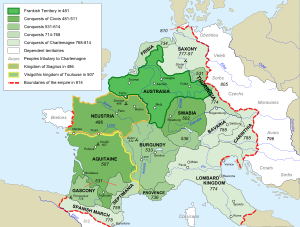
Back الحروب الساكسونية Arabic Саксонски войни Bulgarian Guerres Saxones Catalan Saské války Czech Saksiske krige Danish Sachsenkriege Karls des Großen German Guerras sajonas Spanish Saksi sõjad Estonian Guerre des Saxons French Saksekriich Frisian
| Saxon Wars | |||||||||
|---|---|---|---|---|---|---|---|---|---|
 Frankish expansion from 481 to 814 | |||||||||
| |||||||||
| Belligerents | |||||||||
| Commanders and leaders | |||||||||
|
Widukind | ||||||||
| Casualties and losses | |||||||||
| Unknown |
| ||||||||
The Saxon Wars were the campaigns and insurrections of the thirty-three years from 772, when Charlemagne first entered Saxony with the intent to conquer, to 804, when the last rebellion of tribesmen was defeated. In all, 18 campaigns were fought, primarily in what is now northern Germany. They resulted in the incorporation of Saxony into the Frankish realm and their forcible conversion from Germanic paganism to Christianity.[1]
The Saxons were divided into four subgroups in four regions. Nearest to the ancient Frankish kingdom of Austrasia was Westphalia, and farthest was Eastphalia. In between the two kingdoms was that of Engria (or Engern), and north of the three, at the base of the Jutland peninsula, was Nordalbingia. Despite repeated setbacks, the Saxons resisted steadfastly, returning to raid Charlemagne's domains as soon as he turned his attention elsewhere. Their main leader, Widukind, was a resilient and resourceful opponent, but eventually was defeated and baptized (in 785).
- ^ Jennifer R. Davis (2015), Charlemagne's Practice of Empire (Cambridge: Cambridge University Press), p. 179. The Royal Frankish Annals record battles in the years 772–780, 782–785, 793–799, 802 and 804.
© MMXXIII Rich X Search. We shall prevail. All rights reserved. Rich X Search